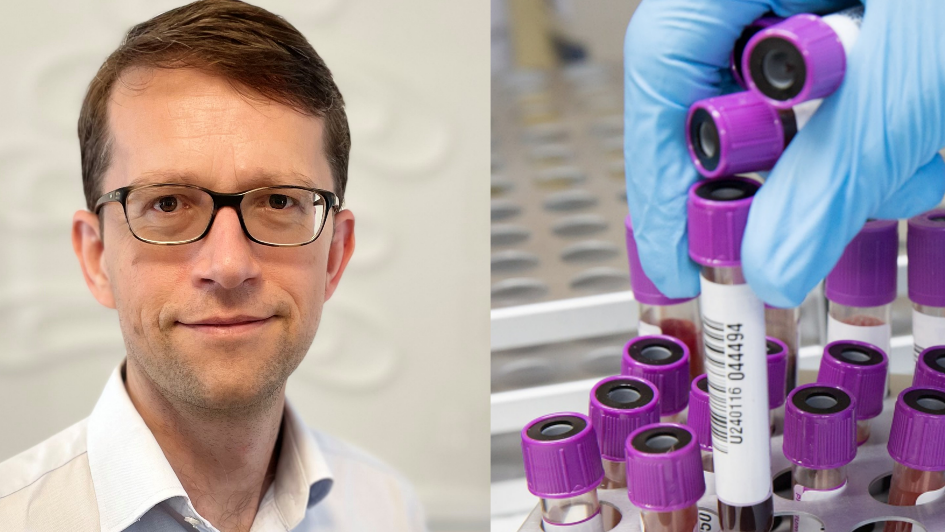
Image: Photo of Professor Nick Turner (left-hand side), next to an image of blood samples in test tubes (right-hand side)
The ESMO Award for Translational Research is given annually to a candidate who is internationally recognised for their outstanding achievements in translational research, which has led to successful application in the clinic. Following in the footsteps of many major figures in cancer research, we were proud that Professor Nick Turner was awarded this prestigious honour.
The award will be presented at the opening ceremony of the ESMO 2023 Congress, which is taking place this week. We interviewed Professor Turner about his achievements throughout his career, the factors that contributed to winning the ESMO award and his future research.
Early career and contributions to translational medicine
Before joining the ICR, Professor Turner studied at the University of Cambridge and University of Oxford Medical School. He completed his training as a Medical Oncologist at The Royal Free and University College Hospital in London and received his PhD from the ICR in 2006. He then joined the Breast Unit of The Royal Marsden as a Consultant in Medical Oncology in 2008, specialising in the treatment of breast cancer.
Professor Turner is now Professor of Molecular Oncology and a Group Leader in the Breast Cancer Now Toby Robins Research Centre at the ICR – a world-leading facility comprising more than 70 cancer researchers, and he is Head of the Ralph Lauren Centre for Breast Cancer Research at The Royal Marsden.
Professor Turner's research involves analysing and validating new breast cancer therapies for different molecular subtypes of the disease. He is Chief Investigator of a number of national and international trials of precision therapy in breast cancer. He helped pioneer and develop an innovative type of personalised blood test called a liquid biopsy that can predict when a patient's breast cancer will return and spread.
“We've worked on a number of research areas in the lab. One project that has had a significant impact on patients is our work on liquid biopsies for people with metastatic breast cancer. We have also demonstrated their potential in identifying which patients are at risk of relapse in early breast cancer settings,” he said.
“Another substantial aspect of our research has focused on understanding the mechanisms behind therapy resistance in metastatic breast cancer patients. Our work, particularly in deciphering resistance to CDK 4/6 inhibitors, has greatly influenced the development of these drugs and their targeting of resistant disease.”
The role of collaborators
This isn’t the first major prize Nick has received for his research – others include the AACR Outstanding Investigator Award for Breast Cancer Research in 2017, the Pezcoller Foundation – EACR Translational Cancer Researcher Award in 2022, and he was part of the joint team from the ICR and The Royal Marsden that won the AACR Team Science Award in 2022.
“It's an honour to have received such a prestigious award. This is a reflection of the whole team’s hard work and that of our collaborators over the years,” he said about the new ESMO award.
Professor Turner also emphasised the crucial role of the partnership between the ICR and The Royal Marsden in his translational work:
"The partnership between The Institute of Cancer Research, as a world-leading research institute, and the renowned cancer hospital The Royal Marsden has played a pivotal role in shaping my work and fostering my growth as a scientist, ultimately contributing to the receipt of the ESMO award for translational research. I am very grateful for the invaluable support that I have received from my clinical colleagues and The Marsden throughout my career.”
The importance of mentorship
Professor Turner recognises the value of mentorship in a research career and has two key mentors, who helped his career development.
"One of my mentors is definitely Professor Alan Ashworth, my PhD supervisor, who later became the CEO of the ICR. He was highly influential and supportive during the early stages of my career and has had a significant impact on my approach to science.
"On the clinical and clinical trial side, I would like to mention Professor Ian Smith, who held the position of Professor of Breast Cancer Medicine at The Royal Marsden. He has had a substantial influence on this aspect of my career, and we still keep in touch.’’
What's next?
Despite the great progress we’ve seen in breast cancer research and treatment, there’s still much to do – particularly when it comes to maximising the potential of liquid biopsies in the clinic so they can benefit many more patients.
"We’re conducting several trials involving liquid biopsies in early-stage breast cancer patients, with the goal of demonstrating their potential to guide therapy, enhance outcomes, and eventually become a standard of care in the future. Additionally, we are actively researching the factors that drive resistance to therapy in metastatic settings to develop more effective therapeutic approaches.”
Continued funding is essential to ensuring progress in research and Breast Cancer Now has been a major funder of Professor Turner and his team over the years, along with support from Cancer Research UK through two rounds of clinician scientist fellowships.
"We're reapplying for Breast Cancer Now funding and we hope to have ongoing support from them, as well as from a charity that supports the Royal Marsden Cancer Charity called Le Cure de France, which is raising money to support some of our clinical implementation work."
After two decades of impactful research, we look forward to further advances from Nick and his team in the coming years that will help improve and save the lives of breast cancer patients in the UK and around the world.
comments powered by